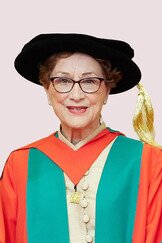

Mr Pro-Chancellor,
Professor Dame Carol Black has played many important roles in a multi-layered career as a clinician, a scientist, an administrator, a reformer, and an advocate. She received national as well as global recognition for the Centre she established at the Royal Free Hospital in London to generate research and treatment of scleroderma (rare but frequently fatal) and other connective tissue diseases. She became President of the Royal College of Physicians of London in 2002 and Chair of the Academy of Medical Royal Colleges in 2006, modernizing and raising the public profiles of both institutions. She has been a life-long champion of women in medicine and has devoted decades of work on social aspects of medicine. Her pioneering work has had long-term impact on the entire medical profession.
In preparing this citation, I had the privilege to read a personal account of Dame Carol’s life and work, in which she begins with a most vivid description of her humble origins and youthful days. An only child of working-class parents, she nonetheless excelled in academics and enrolled as a history major at Bristol before she realised that it was indeed medicine she wanted to pursue. But her path to medicine was by no means smooth. She took a detour and joined the VSO scheme (Voluntary Service Overseas) and was sent to the Gilbert and Ellice Islands, in the West Pacific Ocean near Fiji, for what she calls “a year crowded with experiences.” She came to medicine at the age of 25, “seven years later than most students, and medicine and more broadly healthcare have given me the greatest possible pleasure and fulfilment.”
Following what she calls “a light bulb moment” in 2004-05, Dame Carol “developed a growing interest in the social determinants of health, particularly employment and worklessness.” From this point on, she became deeply involved with social aspects of medicine. She applied for and got the post of National Director for Health and Work, where she provided independent leadership for a new 5-year funded cross-government Health, Work and Wellbeing agenda. She stayed in that role until 2012 and then became an Expert Adviser to the Department of Health, NHS England, NHS Improvement and Public Health England. In those roles, she authored three influential independent reviews on workers’ health and wellbeing issues—in 2008 on the health of the working-age population, in 2011 as co-chair on sickness absence in Britain, and in 2016 on the employment outcomes of addiction to drugs or alcohol and obesity.
Here is someone who has passionately and wholehearted devoted her talent and energy to effecting changes in healthcare, welfare and employment practice, and to that end, Dame Carol has tirelessly galvanised support across government, public and private organisations, the non-profit sector, and various communities and individuals. The message she has tried persistently to convey is that workplace health is instrumental to the entire population’s wellbeing and to our sustainable future. Over the years, her work has brought along positive changes in government policy and industry practice.
Dame Carol’s work in recent years has not slowed down at all. Published in 2021, her latest independent review for the UK government is on illicit drugs, with a survey of the market and associated major crimes, followed by concrete suggestions for improvement of treatment and recovery from addiction. This has informed a new ten-year anti-drug strategy, adopted and funded by the UK government.
Currently, Dame Carol finds time to chair the board of the British Library while also leading the board of Think Ahead, a fast-track training programme for Mental Health Social Workers. With mounting mental health crisis in our post-pandemic world, a rapidly expanding training programme like Think Ahead, now into its sixth cohort of 160 trainees, is a most timely intervention and is a model that could be followed by other nations and communities.
I also asked Dame Carol to name the greatest challenges of our time. In addition to climate crisis, she noted another wave of “world-wide poverty and displacement.” This comment underscores her deep awareness of environmental degradation’s unequal impacts on the poor, the vulnerable, and the marginalized. Crises on many fronts are thus compounded, making our joint efforts all the more challenging. Nonetheless, Dame Carol said she wanted to be remembered as “an effective agent for change, for societal good,” and advised our students to “pursue the ambitions you form for yourself, not those others wish for you.” Speaking by Dame Carol’s example, it is indeed by pursuing our own ambitions, we are more likely to stick to the course regardless of detours, setbacks, or disappointments.
Mr Pro-Chancellor, today we gather here to recognise Dame Carol not only for her revolutionary ideas and activisms that have helped modernise the medical profession and led to some important social innovations, but also for her extraordinary example as an unfaltering leader who never gives up, who always keeps her humble origins in mind, and who never hesitates to use her own experiences to inspire others. It is therefore my great honour and tremendous privilege to present to you Professor Dame Carol Black, for the award of Doctor of Social Sciences honoris causa.
Citation written and delivered by Professor Nicole Huang, Public Orator, the University of Hong Kong.



